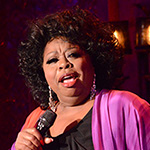Meg Flather
Back When We Were Beautiful
Don’t Tell Mama, NYC, February 17, 2018
Reviewed by Alix Cohen for Cabaret Scenes
 Meg Flather’s Back When We Were Beautiful is one of the most creative, well-crafted, and courageously personal shows I’ve seen in some time. Her subject—women, pointedly including herself—is once again highly topical, the performer’s perspective piercingly lucid.
Meg Flather’s Back When We Were Beautiful is one of the most creative, well-crafted, and courageously personal shows I’ve seen in some time. Her subject—women, pointedly including herself—is once again highly topical, the performer’s perspective piercingly lucid.
https://pregnancytesthome.com/wp-content/languages/new/lipitor.html
Some songs familiar in other contexts arrive with radically reinterpreted meaning. What could spell disaster works to surprise and compels. Signature wry humor supports the piece like vertebrae. Wrenching parentheses catch one unaware. Flather’s attractive alto has gained tensile strength without losing an ounce of warmth or nuance.
online pharmacy https://aclsedu.com/wp-content/uploads/2023/04/jpg/stromectol.html no prescription drugstore
Key changes are fluid.
Opening with young love, the vocalist shares Suzanne Vega’s “Gypsy,” apparently written when Vega was 18 as a gift to a young man with whom she was infatuated.
online pharmacy https://aclsedu.com/wp-content/uploads/2023/04/jpg/vibramycin.html no prescription drugstore
buy clomiphene online http://alluredentalcare.co.uk/wp-content/themes/twentytwentythree/styles/json/clomiphene.html no prescription
In return, she received his bandana.
https://pregnancytesthome.com/wp-content/languages/new/flexeril.html
Music rises and falls in waves. Flather sounds like ’60s folk—unfussy and authentic. The first of many appealing harmonies with music director/pianist Tracy Stark enhances.
“For some of us, first love wasn’t mutual. Restraining orders were necessary.” Melanie’s “Brand New Key,” originally bubble-pop, is decidedly dark: “Well, I’ve got a brand new pair of roller skates/You’ve got a brand new key/I think that we should get together/And try them on to see…” could dramatically fit into Sweeney Todd. Flather mimes skating (with a vengeance) between verses. She refers to this as a stalker song. Stark’s echoing vocal back-up is cautionary. Speaking of which, wait till you hear what she’s done with “(I Love It When You) Call Me Names” (Joan Armatrading).
A charming anecdote about the performer’s (inadvertent) early career in cosmetics prefaces Nanci Griffith’s “Love at the Five and Dime,” a plainspoken, iconically Middle-American tale. From innocence to middle age, the show’s title song (Matraca Berg) contains part wistful, part bitter musings of a woman who unearths old photos of her greatest love. Like most of us, she doesn’t like aging at all. Flather seamlessly speaks some lyrics, inhabiting the role. Later, 1933’s frothy “Keep Young and Beautiful” (Harry Warren/Al Dubin) erupts as an aggressive-verging-on-manic sales pitch. Listen carefully. Seductive advertising, she notes, contains implicit threat.
Acting chops grow expansive for “Mr. Selleck” (Terre Roche) in which a feisty, failed performer desperately wants her waitressing job back. Flather dances in a circle, waving her arms as if a willing marionette, with spoken reference to glass ceilings bridges.
A heart-wrenching “Back to Before” (Lynn Ahrens/Stephen Flaherty) is preceded by a candid and distressing story about her parents and grandparents. Flather palpably empties herself into the song, soaring without rasp or volume. Lavish piano underpins, but doesn’t overwhelm. This also occurs down the line with “Another Winter in a Summer Town” (Scott Frankel/Michael Korie) whose accompaniment might make you shudder: “…Yesterday’s dreams/ A faded bouquet/ Roses that died on the vine/ Yesterday seems more real than today/ It’s difficult drawing the line/ My season ended/ A long time ago…/ Longing increases when trees are bare, streets all but deserted, neighbors gone/ When there’s nothing to soften and distract.” Flather briefly IS that woman.
“Out of all the great loves in a woman’s life, the most complicated, rich, and rewarding is the bond between mother and daughter…” Unexpectedly, the song chosen to express the artist’s feelings is Jerry Herman’s “My Best Girl,” sung by young Patrick to reassure his Auntie Mame at a low point. Its tender performance evokes tenderness, intimacy, and history.
We close with one of Flather’s parents’ favorites, “Moon River” (Johnny Mercer/Henry Mancini), which she now perceives as the ever-flowing continuity of life. It arrives a song of hard-won faith.
This has got to be one of music director/accompanist/vocalist Tracy Stark’s best efforts to date. Both musical and vocal arrangements are imaginative and collaborative.
https://pregnancytesthome.com/wp-content/languages/new/strattera.html
Back-up works splendidly.
Director Lennie Watts—“Mr. Grant to my Mary Tyler Moore”—has encouraged Flather to loosen up and express herself more demonstrably without intruding on the minimalist approach that channels focus into lyrics. My single caveat is that Flather almost never looks at us. When she’s addressing the unseen or herself, this works, but there are at least two numbers that would benefit greatly from inescapable empathy.
The show is extraordinary.
The show is reprised at Don’t Tell Mama on March 15 at 7 pm.





